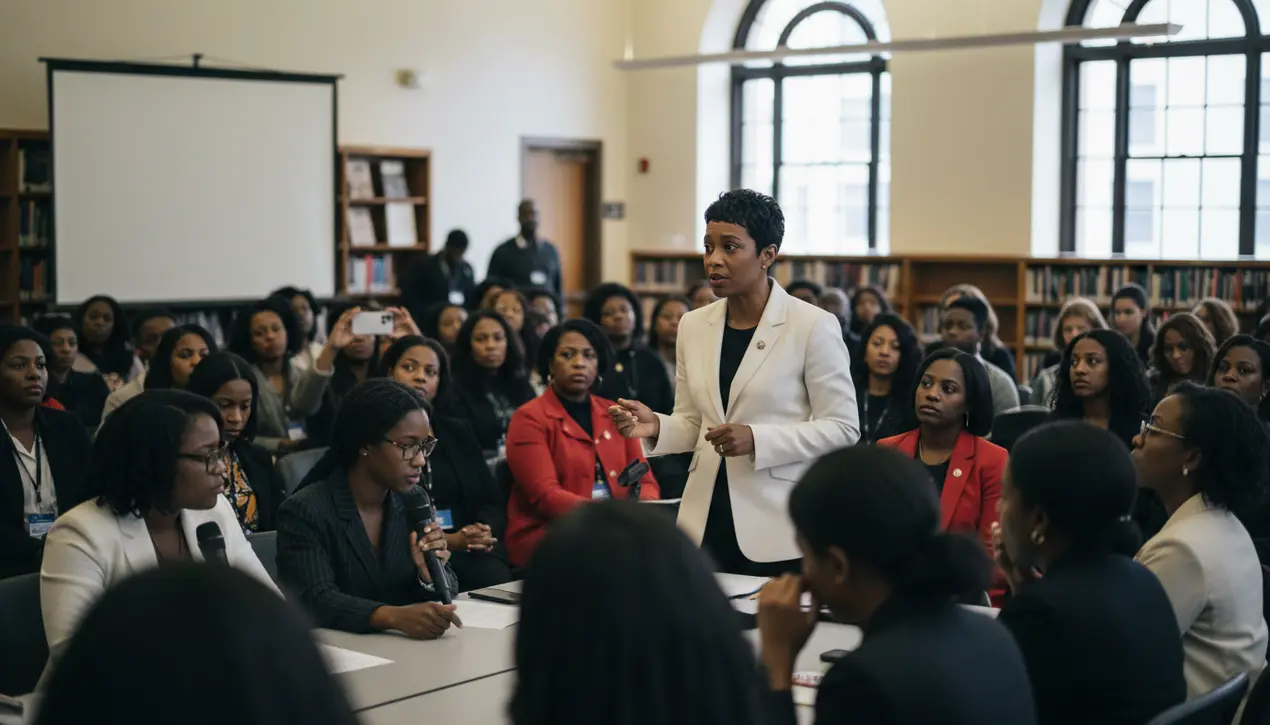
PoliticslegislationLabor and Employment Laws
Rising unemployment rate for Black women sparks calls for change
AN
Anna Wright
4 hours ago7 min read
In a packed room at a library in downtown Boston, Representative Ayanna Pressley posed a blunt question that cuts to the heart of a disturbing economic anomaly: Why are Black women, who historically exhibit some of the highest labor force participation rates in the nation, now experiencing an unemployment surge that outpaces nearly every other demographic? The replies from a gathering of policymakers, academics, and community organizers didn't just outline a statistical blip; they sketched the contours of a systemic failure with profound implications for the entire economy. The most recent data, stalled by a federal government shutdown, already showed a troubling leap.Between August and September, the unemployment rate for Black women jumped from 6. 7% to 7.5%, a sharp and disheartening contrast to the marginal increase from 3. 2% to 3.4% for white women over the same period. This isn't an isolated monthly fluctuation; it's the continuation of a year-long trend of rising joblessness for Black women, a divergence that began to accelerate noticeably around April, all occurring against a backdrop of broad economic uncertainty that seems to be impacting them first and most severely.For the attendees, these numbers are more than metrics; they are an affront and a stark warning about the uneven pressures borne by Black women, who are often the primary or co-breadwinners for their households. 'Everyone is missing out when we’re pushed out of the workforce,' Pressley, a progressive Democrat from Massachusetts, asserted with palpable concern.'That is something that I worry about now, that you have all these women with specific expertise and specializations that we’re being deprived of. ' Her point underscores the cruel paradox: even when employed, Black women are frequently 'woefully underemployed,' their skills and potential languishing in roles that fail to match their capabilities or provide economic security.The structural inequities are long-standing and well-documented. Black Americans are overrepresented in volatile sectors like retail, health and social services, and government administration—industries that are often the first to feel the chill of an economic downturn or the sharp edge of political policy shifts.Historically, the unemployment rate for Black women has consistently trended above the national average, with the gap widening dangerously during periods of recession or slowed growth, acting as a canary in the coal mine for the nation's economic health. As Anna Gifty Opoku-Agyeman, a PhD candidate in public policy and economics at the Harvard Kennedy School, powerfully framed it, 'Black women are at the center of the Venn diagram that is our society.' Their economic stability is inextricably linked to the country's overall prosperity; a policy agenda that ignores the causes of their distress, she warned, inevitably harms the broader economic engine. The roundtable participants identified a confluence of factors driving this latest divergence, but a significant portion of the blame was placed squarely on recent federal actions.They pointed to the Trump administration's systematic downsizing of the Minority Business Development Agency and the cancellation of federal contracts with nonprofits and small businesses—moves that have disproportionately impacted Black women entrepreneurs and workers. The administration's overt opposition to diversity, equity, and inclusion (DEI) initiatives was repeatedly cited as fostering a more hostile environment, making it harder for Black women to secure employment, attract customers, or win government contracts.While concrete data on the demographic impact of President Donald Trump's sweeping federal layoffs is scarce, the anecdotal and sector-specific evidence suggests a disproportionate effect on women and people of color. This policy-driven headwind, combined with broader strains from tariff policies and mass federal layoffs, has created a perfect storm.The discussion of solutions was as wide-ranging as the problem is deep. Ideas circulated included leveraging state budgets to specifically bolster business development for Black women, expanding microloan access to underserved communities, increasing transparency in corporate hiring practices, and a renewed commitment from state and federal officials to rigorously enforce long-standing anti-discrimination policies.As the meeting concluded, Boston City Council President Ruthzee Louijeune captured the collective sentiment, remarking, 'I feel like I was just at church. ' She defended DEI policies not as a peripheral concern but as essential infrastructure for a healthy workforce and a representative political system.Her closing words resonated as a powerful call to action: 'Any space that does not look like our country and like our cities is not normal,' she declared, 'and not the city or country we are trying to build. ' The rising unemployment rate for Black women is more than an economic indicator; it is a test of the nation's commitment to building an economy that works for everyone.
#Black women
#unemployment
#economic disparity
#labor force
#DEI
#federal policy
#featured
Stay Informed. Act Smarter.
Get weekly highlights, major headlines, and expert insights — then put your knowledge to work in our live prediction markets.
Related News
Comments
Loading comments...
© 2025 Outpoll Service LTD. All rights reserved.